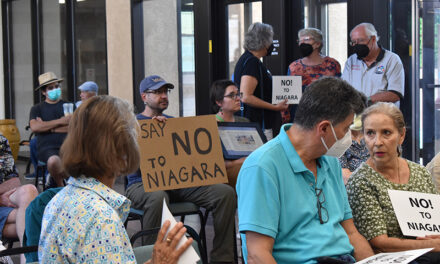Valencia County commissioners Tuesday voted to invite an expert to help them analyze the county jail and the contract to run it.
The suggestion to invite Jack Daley to help county commissioners determine the best approach to the contract came from Commissioner Alicia Aguilar, who presented a history of the jail along with some cautionary comments.
She offered her suggestions after a report from Neil Hartwigsen, a member of the committee studying the county jail.
Aguilar read a letter from Lester Nixon, risk manager of the New Mexico County Insurance Authority, in which Nixon offers Daley’s services. Daley was on the staff of the Insurance Authority when the county was sued for conditions at the previous jail.
Daley “is one of the most knowledgeable people in the field of detention centers,” Nixon says in the letter.
Commissioners agreed to consult with Daley, after two-and-one-half hours of discussion.
The April 15 letter from Nixon says he is offering the county “risk management guidelines.”
He warns the county that there will be questions about whether the Insurance Authority will insure the jail if the county runs it. And, the letter continues, the pool of counties insured by the authority does not cover breach of contract.
“The federal court order resulting from the lawsuit brought by the ACLU (American Civil Liberties Union) against Valencia County and its detention center requires conformance to ACA (American Corrections Association) standards, along with other requirements.”
Hartwigsen said the facility is well run and a model jail, but he said the county cannot afford it.
And, according to the committee’s report, the Valencia County jail is more expensive than comparable jails.
Meanwhile, Lawrence Bar-reras, senior warden at the county jail, has said the company will renegotiate the contract and figure out ways to save the county money.
Services may be reduced at the jail to save money, including marketing beds to inmates from other counties and initiating the use of bracelets to allow nonviolent inmates to work outside of the jail.
Hartwigsen said that the Valencia County jail is more expensive than similar jails, and he questioned whether the county must meet such high standards. However, he added that figures from other jails could be misleading.
“We’re spending $1 million a year we don’t have,” he said. “There are things we can do to help ourselves. We will not solve it tonight, but we can lay the groundwork and see where the opportunities lie. We are in the hole and will stay in the hole until we solve the problem. There must be enough give-and-take on both sides. We may have a model jail in New Mexico. In 1997 (due to an ACLU lawsuit), we may have been scared, and we went overboard (with the amenities to meet standards in the jail). Maybe we have to back off a little bit.”
He suggested the commission “look at those standards which have flexibility.”
In her report to the committee, Aguilar recalled that, prior to the construction of the jail, an analysis was done “on the best method to build and operate this adult detention facility.”
She said, before the facility opened, the commission “was concerned that training processes and procedures were not in place. In addition, the housing of prisoners in other facilities and threatened litigation was continuing to rise.”
According to ACA standards, hours of training are required and “none of this was done,” and it was “an impossible task to do in 90 days” before opening.
“The county began negations with Cornell to manage the facility, train, implement policies and procedures, have medical (services), (provide a) kitchen, (and) required programs to ACA standards in place within 90 days to open the facility in October.
“This contract was subject to full approval by the Department of Finance and Administration and the Attorney General’s office.”
The contract with Cornell also includes savings to the county.
“There are many elements that need to be analyzed and compared before someone can make a recommendation on what to do,” she said.
“Let’s look at the true costs, county responsibility and, before any action is taken, provide assurance that this is the best avenue. This can only be achieved by an independent, unbiased, qualified jail expert,” Aguilar said.
Commissioner Gary Daves, who headed the committee looking at the jail, said Cornell should shave off $1 million from the $3.3 million contract. This would result in savings to put county employees back on 40 hours a week and fund some programs that lost money when the county was forced to reduce its budget.
The county pays Cornell $3.2 million a year out of its $9 million operating budget. The jail was built after a lawsuit from the ACLU over conditions at the previous jail.
Barreras told the commission that Cornell is willing to negotiate and “has a lot of ideas to save money.”
“We have delivered what was asked of us. We’re ready to go through accreditation, but, if the county decides to do something different, we’re ready to do so,” Barreras said.
As he has been before, Daves was adamant in his criticism that the county did not consider another offer from a firm called GRW to run the jail for $1.6 million.
“I hope it creates leverage to get employees back to work. We need to move ahead,” Daves said.
Commissioner Frank Pando said he had never seen the GRW proposal, and Barreras said it did not include all of the features of the Cornell contract.
“It’s unrealistic to run a facility for that price and not be in the position you were in” before the lawsuit form the ACLU, Barreras said.
But Daves disagreed. He said the commission “must insist on a million dollar savings” in the contract.
Before the jail was set to open, the previous jail director resigned, and “we had nothing in the basket, and we ended up with the Cornell contract of $3.3 million,” Daves said.
Pando said he wished to thank Cornell for its willingness to renegotiate the contract.
“They would not have to do anything. They could just say ‘we’ll see you in court,'” Pando said.
Commissioner Helen Baca said she would be pleased “if Cornell can save us one million a year, and we can put our employees back to work and solve our problems. We are in a financial crisis. We cannot serve the public if employees are not back at work. I’m concerned we’ll lose these employees if we don’t act right away.”
Aguilar suggested the commission consult with Daley, who will “review and evaluate the facility and the documentation.”
Daves has criticized Barreras for “representing his company” on the committee, but George Koch, another committee member, said some people felt that having Barreras on the committee was like negotiating “with a fox in the henhouse” but that, in reality, “Lawrence brought things to the table that showed he was interested in solving the problem.”
A motion by Daves to seek the attorney general’s opinion about whether the county can terminate the contract with Cornell died for lack of a second.
“That tells us we haven’t gotten very far,” he said.
Pando suggested that Daley come in and consult with the committee, and it can then come up with recommendations.
“An expert has been offered to us. We can make an unbiased, informed, intelligent decision,” Aguilar said.
Daves agreed but said “it will not necessarily solve our problem. I will not leave this obligation to employees and the public to find some solution as soon as possible.”
















